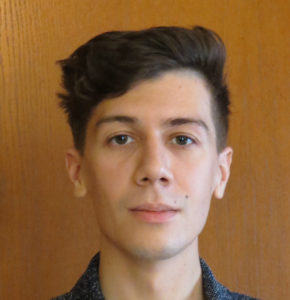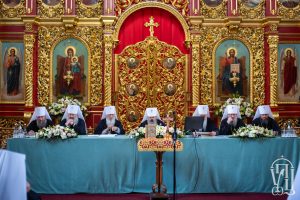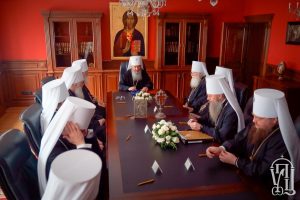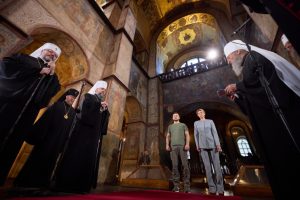
Andriy Fert is a nonresidential fellow at Institut für die Wissenschaften vom Menschen (IWM) and a PhD candidate at Kyiv-Mohyla Academy.
This post looks at the challenges that the Ukrainian Orthodox Church (UOC), affiliated with the Moscow Patriarchate, faced during the first year of Russia’s full-scale invasion of Ukraine. I do this through the perspective of an ordinary parish priest. To protect his anonymity, I call him “Father Antonii,” which is not his real name. This text is based entirely on my two Zoom conversations with Father Antonii in late January 2023.
In many regards, Father Antonii heads a very typical UOC parish. It was established in 1999, built from scratch by a young priest whose father was an Orthodox cleric. Located in southwest Ukraine, the parish unites 1500 households with 150 to 250 people attending Sunday service regularly.
Father Antonii’s parish offers a unique glimpse into the fabric of daily life of the UOC’s religious communities. Caught between the ambiguous politics of UOC leaders and the prospect of being dissolved by state authorities, the parishioners are trying their best to live by their faith and support Ukraine, despite everything.
“May 27 Didn’t Change Much”
The Russian invasion triggered a large-scale movement inside the UOC demanding to stop commemorating Patriarch Kirill and to break ties to Moscow. By mid-March 2022, roughly half of the dioceses had allowed priests to omit the Patriarch’s name during Church services.
The parish of Father Antonii, like dozens of others, began omitting his name eight years earlier, after the annexation of Crimea. Since then, only two families left the parish out of opposition to that decision. But even though the question of commemoration had been decided by the parish, Father Antonii felt obliged to join other priests’ demands to ban Kirill’s commemoration in the whole diocese when the war broke out in February.
What is more, horrified by the sermons of Kirill praising Russian war efforts, Antonii and other local priests sent a message to Church leaders, requesting to “cut the last thread [tying the Church to Moscow] immediately, before Easter.” Their demand was granted a little later, however, a month after Orthodox Easter, on May 27, when the UOC proclaimed “full independence.”

“May 27 was a powerful step indeed,” says Father Antonii, “but it didn’t change much for our parish, as we had cut ties to Kirill long ago.” The father was jubilant about the future of his church. Freed from Moscow, the UOC was expected to build support for its independence among other Orthodox churches and communicate a clear message to Ukrainian society.
Yet as time passed, the ambiguity of that independence brought frustration—a feeling shared by many priests: the pro-Russian bishops were still in charge, the UOC did not publish its new charter specifying what independence from Moscow meant, and in November, Church leaders did not condemn the collaborationism of several high-profile clerics. “We wanted our leaders to speak clearly about our independence from every outlet, but they failed to do so,” concludes Antonii.
The parishioners started to ask what the next step was and what the diocese and the UOC head, Metropolitan Onufriy, were up to, but Father Antonii had no answer. “I typically respond, ‘They [the bishops] didn’t send any instructions and didn’t invite us to clarify anything.’”
“Astronauts in White Hats”
The war sharpened divides between UOC parish priests and their bishops. Mutual alienation between the two is not new and has long existed. The reason is that priests cannot choose their bishop nor effectively influence his decisions, while the bishop’s power over local priests is almost absolute and often arbitrary.
Being installed from a group of monks by other bishops, a new bishop is accountable to ecclesiastical leaders rather than the local church and usually treats his diocese as his “fiefdom,” as many priests privately put it. The Russian invasion illuminated yet another divide: many bishops had not been ready to unequivocally condemn Russia and embrace Ukraine’s struggle against the invaders.
So, unsurprisingly, Father Antonii is vocal in his critique of the bishops. Like many Church leaders, the local bishop was very slow in publicly expressing any support for Ukraine in the war against Russia, opting instead for general condemnation of the war. But in private conversations with diocesan staff (which became known to priests), he allegedly said there was no war at all.
According to Father Antonii, the bishop considers the Russian invasion “God’s Providence,” which the Church can do nothing about. To illustrate his point, Antonii recalls a story told by the rector of another parish. That rector was among those who informed the bishop about the priests’ petition demanding condemnation of Russia. “It’s not a time for that,” the bishop allegedly said, and when asked what the priests should then do, he responded, “You should pray; that’s it.”
Antonii also denounces his bishop’s inability to “hear his flock.” Several times during our conversation, he emphasized that the bishop “had surrounded himself with people who tell him only good news.” When the priests come to tell him about the challenges, he refuses to meet them. From his friends, Antonii knows that many other dioceses face that same problem and jokingly call bishops “astronauts in white hats” who come “from another planet” and don’t know how to do business on Earth.

He is particularly sharp when the conversation brings us to Metropolitan Onufriy: “Our metropolitan is a Man of Prayer, and that is wonderful. . . . Yes, you pray; you’re a monk, and I can relate. But it’s not enough, and we need a manager. You [Metropolitan Onufriy] are a bishop, and you are responsible for the Church.”
Disillusionment with the bishops has translated to the growing importance of parish priest networks—the deaneries. Offering a place for priests of several neighborhoods to meet on a regular basis, deaneries have become spaces of dialogue where priests can share their concerns and get much-needed support. The deaneries, however, can only minimally influence the bishop, as Father Antonii confides. The frustration is so tangible that one priest said to him in exasperation, “Now it’s not enough to only smash (the bishop’s) Mercedes; we have to punch him in the face instead.”
“No One Really Wants to Transfer”
As the war ravages, many parishes are fleeing the UOC to join the rival Orthodox Church of Ukraine (OCU). According to estimates, more than 600 parishes have left the Church since February 2022. A closer look, however, reveals the situation is complicated.
Neither the Church nor the 1991 Law on Freedom of Conscience and Religious Organizations can clearly say who in the parish can decide to transfer. For instance, state authorities held that every citizen in a given territory can self-identify as belonging to a parish and thus can vote regarding the transfer. UOC priests, on the other hand, argue that the right to vote belongs solely to regular church attendees. As both sides fail to offer any measurable indicators constituting an eligible voter, “violations” during transfer voting are abundant.
Father Antonii, like many priests, believes that “only participation in liturgy and sacraments” makes a parishioner. Those participants constitute a “core” of his parish and have a right to vote. Still, that qualification does not translate into a strict list of persons with legal consequences. At the same time, Antonii dismisses the state approach: “How can we give the right to decide on the Church’s future to those who can barely recite ‘Our Father’?”
The parish dreads the possibility of being seized by those “indifferent once-a-year visitors” recognized as parishioners by the state. Driven by patriotic feelings, according to Father Antonii, they can come to the church solely to vote on joining the OCU. He recounts how, in several instances, the local authorities in neighboring villages brought “strangers” to church, some of them in military uniform, to secure transfer: “Sometimes the parish people manage to boo them out; sometimes they don’t.”
In light of these fears, Father Antonii’s parish does not consider transferring to the OCU. On the eve of the OCU creation in 2018, Antonii told his flock that “soon there’ll be two parallel legitimate [ecclesiastical] structures in Ukraine” and asked if they wanted to join the new one. No one spoke in favor, and the 2022 Russian invasion did not change that.
And yet Father Antonii has a rather uncommon view of the rival church. Unlike many of his fellow priests, he recognizes—albeit with reservations—the legitimacy of the OCU. Still, he maintains that neither he nor the priests he knows want to join it because only a few other Orthodox churches in the world have accepted it.
Like many other priests in the UOC, he feels discouraged by the “aggressive rhetoric” of the rival church—“They only speak about politics, about us being Muscovites”—and cites many cases of violent seizures of church buildings by the OCU. (The OCU, however, insists that all transfers are voluntary and based on parishioners’ will to depart from Moscow.) The local OCU priest, according to Antonii, speaks of him and his church only in derogatory terms, so Antonii feels uncomfortable even meeting him, let alone discussing possible unification.
On the first anniversary of the full-fledged war, Father Antonii finds himself in a deadlock. On the one hand, he believes that the OCU “will never accept us. We’ll always be Muscovites for them.” To reinforce this point, he cites the example of several priests from his diocese who joined the OCU: “They had to create a separate deanery for them alone, as no one [inside the OCU] wanted to have them.” On the other hand, he denounces the UOC’s practice of branding itself as the only legitimate Orthodox church in Ukraine and naming all others “schismatics,” as it does nothing to promote peaceful coexistence. He concludes, “Unification must not include humiliation” and specifies that “we should probably go on existing in parallel.”
“We Have Always Stood Side by Side with Our Local Folks”
After 24 February, the UOC faced significant pressure from the state. This includes bans introduced by many local authorities forbidding the UOC from legally existing in several towns and villages. The ambiguous statements of UOC leaders regarding collaborationism have resulted in strong public demand to ban the Church nationwide. As a result, priests like Father Antonii find themselves trapped between “deaf” bishops whose statements only place the parish in trouble and increasingly hostile public opinion and authorities from all levels.
Navigating his parish between Scylla and Charybdis, Father Antonii and church volunteers spend their days collecting humanitarian aid and raising money for the Ukrainian Army. He is proud of his parish’s significant contribution, saying that tons of aid have been collected since 2014.
Because his humanitarian efforts have been known since 2014, Father Antonii has good relations with the local community. He also takes part in local events, like the consecration of monuments or ecumenical prayers dedicated to national memorial days. Still, he finds it essential to emphasize that “ecumenical” does not mean he prays together with priests from other churches; they instead stay side by side, and each prays his separate prayer.

He acknowledges that there are priests who refuse to participate in such events, thus avoiding OCU clerics, but he calls this approach “unreasonable,” as it creates unnecessary tensions within a community. “We have always stood side by side with our local folks—perhaps that is why we don’t have any problems now,” he explains.
Problems exist, however. One woman who belonged to a parish for a decade left it after 24 February. Her husband had reportedly opposed her going to what he called “the Moscow Church.” In addition, the local government officials responsible for covering the expenses for soldiers’ burials “tell the relatives that to receive the money, they should take the coffin to the OCU church for a memorial service,” confides Father Antonii.
“We Don’t Know What to Do”
Since the proclamation of its independence from the Russian Orthodox Church in late May 2022, the UOC has not managed to kick off any reforms to implement that independence. Many clerics notable for their pro-Russian sentiments are still in power, and Church leaders fail to effectively distance their church from Russia in the eyes of the public. As a result, the Ukrainian state is considering a nationwide UOC ban. A draft law has already been submitted to the Ukrainian Parliament.
Touching on the prospect of a ban, Father Antonii reveals he has no idea what to do if restrictions are introduced: “We discuss that with other priests at the deanery meetings. No one has a Plan B; we don’t even have lawyers.” He also confided that “perhaps, in the end, we’ll have no other way but to join the OCU, but like I said—no one wants to join it.”
Many priests are frustrated by ecclesiastical leaders, blaming them for jeopardizing their parishes. The divides between parish priests and bishops are deepening, but bishops still have a lot of power that no priest can challenge. At the same time, the parishes alone have to deal with suspicion and resentment of the locals that, in many instances, are sparked by the short-sighted bishops’ statements. “We remain faithful to the Church not because of any efforts made by our bishops but rather despite those efforts,” concludes Father Antonii bitterly.
